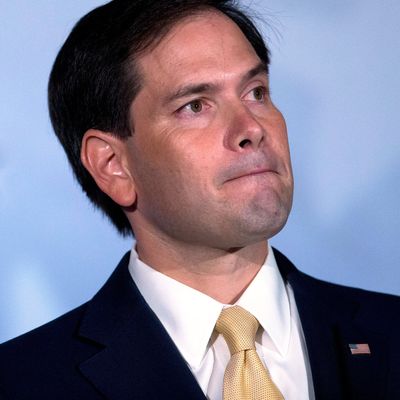
The one Republican presidential candidate who is on everybody’s list of candidates thought to be viable is Florida senator Marco Rubio. The reasons are not hard to discern: He’s young and reasonably eloquent (as evidenced by his debate performances so far). He has a fine personal “story” and ethnic identity that could theoretically mitigate the damage Republicans have been doing to themselves among Latino and Asian-American demographic groups. He appeals to different wings of the GOP for different but not conflicting reasons, as reflected in persistently solid approval ratios. He’s from a key battleground state. And, best of all, he is rumored to strike fear in the hearts of Democrats.
Early in the Invisible Primary, Rubio was thought to be “blocked” by the money and Sunshine State street cred of Jeb Bush. Now Rubio is blocking Jeb by offering an Establishment-friendly but conservative-acceptable alternative to a candidate with crucial weaknesses among both base and swing voters, and steadily eroding poll numbers. None of the other Establishment candidates have gained much traction. And he’s even beginning to score some points in the “endorsement primary” that many political scientists swear by as the best indication of which way the wind is blowing.
So, assuming Rubio can avoid mistakes and survive rumors of financial or sexual improprieties (which at some point will be discredited, if only because Team Bush, with all its resources, cannot seem to find a smoking gun), he’s got a pass to the “finals” against the presumably unelectable Trump and the abrasive Cruz, right?
Maybe, but there’s a problem: At some point, you have to start winning caucuses and primaries to win the nomination. And it’s hard to identify right now where Rubio is supposed to claim his first victory.
Iowa does not look like Rubio Country; marginal candidates like Huckabee and Santorum will go for broke there; Cruz and Trump seem to be battling for the lead; the powerful nativist faction led by Representative Steve King will not let anyone forget Rubio’s immigration heresy; and for all his on-paper appeal, the Floridian doesn’t look like the sort of candidate who inspires the kind of passionate support necessary for a last-minute Caucus surge.
In New Hampshire, Trump is strong; the Iowa winner will get a bump; and even as the archconservative candidates fought against “winnowing” in Iowa, the remaining center-right candidates will go for broke, including Chris Christie, newly invigorated by his own strong debate performances, plus an endorsement from the Union-Leader.
. And on March 15, he will face the existential challenge of a winner-take-all Florida primary he cannot afford to lose.
His hopes for an early splash may depend on the unlikely venue of Nevada, where his early years as a an ex-Catholic Mormon in Las Vegas reportedly could give him an edge among the LDS voters whose mobilization for Mitt Romney played an outsize role in that state in the last two cycles.
This does not sound like a sure bet to me.
Scott Walker is generally thought to have become the Tim Pawlenty of this cycle, with a strong theoretical appeal across party factional lines that faded like a mocking cheshire cat smile when actual voters were consulted. But in the largest presidential field in recent memory, there may be room for two flameouts. Marco Rubio needs to put his foot on the gas somewhere, anywhere.






























